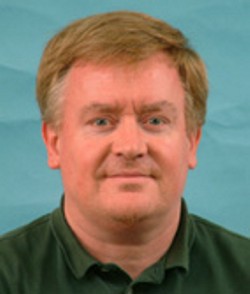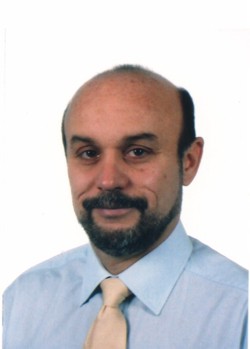Keynote Speakers
Tuesday, 8th September
Christian Jacquenet (Orange Labs, France)
Wednesday, 9th September
Luiz DaSilva (Trinity College Dublin, Ireland)
Thursday, 10th September
Networking in the Big Data Era
Nelson Fonseca (State University of Campinas, Brazil)
Presentations can be downloaded from the links at the bottom of this page.

- Christian Jacquenet
Tuesday, 8th September
Fostering IoT Deployment: Challenges and Assets of SDN Techniques
Christian Jacquenet (Orange Labs, France)
Abstract: The Internet of Things (IoT) is a highly constrained, much larger networking environment than legacy infrastructures as operators have known them for decades. With the foreseen tens of billions of connected objects, IoT is the de facto networking infrastructure for a plethora of new services. Some of these services are seen by many operators as key business development opportunities: they are (or will be) deployed in home and urban environments, while others (like e-health or energy distribution services) may solicit network, computation and storage resources at the scale of a region or a country. From an IoT connectivity service standpoint, the subsequent design and operation complexity is further aggravated by the inherent dynamics of the networking infrastructure: connected devices may rapidly (re)-graft to or be pruned from the IoT networking infrastructure as a function of their CPU load or remaining energy, or because the device is in motion. The ability to select what capabilities need to be invoked to dynamically orchestrate and deliver an IoT service can therefore take advantage of the inherent flexibility provided by Software-Defined Networking techniques that include dynamic service-inferred IoT resource allocation and policy enforcement schemes as well as feedback mechanisms for IoT service fulfilment and assurance purposes. This talk will discuss how SDN techniques can help fostering IoT development and what are the main challenges that need to be addressed.
Christian Jacquenet graduated from the Ecole Nationale Supérieure de Physique de Marseille, a French school of engineers. He joined Orange in 1989, and he is currently the Director of the Strategic Program Office for advanced IP networking within Orange Labs. In particular, he is responsible of Orange’s IPv6 Program that aims at defining and driving the enforcement of the Group’s IPv6 strategy and conducts development activities in the area of Software-Defined Networking (SDN) and service function chaining. He authored and co-authored several Internet drafts and RFC documents in the field of dynamic routing protocols and resource allocation techniques, as well as multiple papers and books in the areas of IP multicast, traffic engineering and automated IP service delivery techniques. He also holds several patents in the area of IP networking.
Wednesday, 9th September
Mobile Operators, Service Providers, and the Virtualisation of Wireless Networks
Luiz DaSilva (Trinity College Dublin, Ireland)
Luiz A. DaSilva holds the chair of Telecommunications at Trinity College Dublin, Ireland. He is also a Research Professor in the Bradley Department of Electrical and Computer Engineering at Virginia Tech, USA. His research focuses on distributed and adaptive resource management in wireless networks, and in particular cognitive radio networks, dynamic spectrum access, and the application of game theory to wireless networks. Prof. DaSilva is currently a principal investigator on research projects funded by the National Science Foundation in the United States, the Science Foundation Ireland (SFI), and the European Commission under Framework Programme 7 and Horizon 2020. He is a co-principal investigator of CONNECT, the Telecommunications Research Centre in Ireland and holds a Principal Investigator grant from SFI. He has co-authored two books on wireless communications and is currently an IEEE Communications Society Distinguished Lecturer.

- Nelson Luis Saldanha da Fonseca
Thursday, 10th September
Networking in the Big Data Era
Nelson Fonseca (State University of Campinas, Brazil)
Abstract: The volume of data being produced today is increasing to astronomical levels; such huge volumes of data are currently known as Big Data. Indeed, the recent introduction of smartphones and tablets, together with the widespread use of social networks, has even turned individuals into active sources of data production. Facebook receives approximately 30 billion uploads every month, implying a daily generation of 10 terabytes (TB) of data, while Twitter generates more than 7 TB of data every single day. Equally important is the information generated by the use of 5 billion mobile phones worldwide. These realms of data must also be processed to transform them into useful information and discover hidden inter-data relationships. Today, we are on the verge of a new era, and advancement will depend crucially on our capacity for effective and efficient communication of such enormous quantities of data. In consonance, in this talk, I will discuss the major challenges for networking technology in the provisioning of communication in the emerging era of Big Data.
Nelson Luis Saldanha da Fonseca obtained his Ph.D degree from the University of Southern California in 1994. He is a Full Professor at the Institute of Computing, State University of Campinas, Brazil. He supervised 50+ graduate thesis and published 300+ refereed papers on different topics such and multimedia service, traffic management and resource allocation in clouds and virtualized networks. He received the ComSoc Joseph Lo Cicero Award for Exemplary Services to Publications, the Medal of the Chancelor of the University of Pisa, the State University of Campinas Zeferino Vaz award for academic productivity in Computer Science and the Elsevier Computer Network Journal Editor of Year 2001 award. His graduate students received several awards in Latin America Thesis contests. Currently, he is the ComSoc Director for Conference Development and he served as ComSoc Vice President Member Relations, Director of Latin America Region and Director of On-line Services. He is past EiC of the IEEE Communications Surveys and Tutorials and a Senior Editor for the IEEE Communications Magazine. He is on the editorial board of Elsevier Computer Network Journal, Peer-to-Peer Network and Applications, Journal of Internet Services and Applications and Journal of the Brazilian Computer Society. He founded the conferences IEEE LATINCOM, IEEE LATINCLOUD and the series of Multimedia Communications Symposium in IEEE ICC and IEEE Globecom. He also chaired over 10 IEEE conferences.


